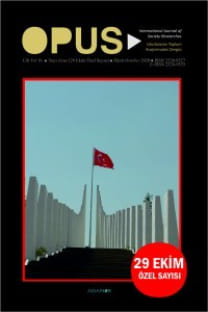Genç Yetişkin,Yetişkin ve Yaşlı Anadolu Erkeklerinde Burun Tiplerinin Çoklu Uyum Analizi ile İncelenmesi
Uyum Analizi (Correspondence Analysis), kategorik değişkenlerin yorumlanmasını kolaylaştıran, çapraz tablolarda (uyum tablosu, olumsallık tablosu, kontenjans tablosu, çapraz tablo, birliktelik tablosu) satır ve sütun değişkenleri arasındaki benzerlik, farklılık ve ilişkilerin yorumlanmasını kolaylaştıran ve bu değişkenlerin birlikte değişimlerini, daha az boyutlu bir uzayda grafiksel olarak gösteren bir yöntemdir. Özellikle tıp, sağlık bilimleri, biyometri, ekonomi, pazarlama ve sosyal bilimler gibi kategorik verilerin analizine ihtiyaç duyulan alanlarda oldukça popüler bir yöntemdir. Uyum analizinin, çok değişkenli analiz tekniklerinden Temel Bileşenler Analizi (Principal Component Analysis), Log-Lineer (Log-Linear) ve Çok Boyutlu Ölçekleme (Multi Dimensional Scaling) yöntemleriyle de benzerliği bulunmaktadır. Türkiye’ de 20 yaş ve üzeri toplam 300 sağlıklı gönüllü bireyin ölçülen burun tipi gamındaki profilini ortaya koymak için 4 burun tipi belirlenmiştir. Bunlar; narrow, medium, broad, very broad. Belirlenen bu tiplerin yaş durumlarına göre uyum analizi yapılmıştır. Çoklu uyum analizi sonucunda ilgili değişkenlerin ilk iki boyutu açıklama oranı %100 olarak bulunmuştur. İlgilenilen değişkenlerden burun tipi durumu %83,1’lik bir oranla birinci boyutta, yaş kategorileri ile burun tipi yakınması ise %16,9’lik bir oranla ikinci boyutta ağırlıklı olduğu gözlemlenmiştir.
Anahtar Kelimeler:
Çoklu Uyum Analizi, Homojenlik Analizi, Ağırlıklı En Küçük Kareler, Adli Bilimler, Adli Antropoloji
Investigation of Nose Types of Young Adult, Adult and Elderly Anatolian Men With Multiple Adaptation Analysis
Correspondence Analysis, which facilitates the interpretation of categorical variables, facilitates the interpretation of similarities, differences and interrelations between the row and column variables in cross tables (compliance table, contingency table, concurrency table, crosstable, correspondence table) and changes of these variables together, is a method that shows graphically in space. It is a very popular method especially in areas where categorical data such as medicine, health sciences, biometrics, economics, marketing and social sciences are needed. Compatibility analysis is also similar to the Principal Component Analysis, Log-Linear and Multi Dimensional Scaling methods. In Turkey 20 years and older 4-type nose for a total of 300 healthy volunteers to demonstrate the profile of the measured range was determined nose type. These; narrow, medium, broad, very broad. Compliance analysis was performed according to the age of these types. As a result of the multiple fit analysis, the first two dimensions of the related variables were 100%. The nasal type was observed to be predominant in the first dimension with a rate of 83.1% and the nasal type with a 16.9% ratio in the second dimension.
Keywords:
Multiple Correspondence Analyses, Homogeneity Analyses, Weighted Least Squares, Forensic Sciences, Forensic Anthropology,
___
- Benzécri, J.-P. ve ark. (1972). L’Analyse des Données, tome 1: La Taxinomie, tome 2 : l’Analyse des correspondances , Dunod, Paris.
- Cangür Ş., Sığırlı D., Ediz B., Ercan İ., Kan İ. (2005). Türkiye’de özürlü grupların yapısının çoklu uyum analizi ile incelenmesi. Uludağ Üniversitesi Tıp Fakültesi Dergisi 31 (3) 153-157.
- Cetli, E., Özkoçak, V. (2018)," Use Of Recorded Personal Data In Forensic Sciences", Avrasya Sanat Ve Medeniyet Dergisi, S.10, s.1-12.
- Gifi, A. (1990). Nonlinear multivariate analysis. New York, John Wiley&Sons.
- Greenacre, M. J. (1981). Practical correspondence analysis. Interpreting Multivariate Data. (Editor, V. Barnett), John Wiley & Sons. Ltd., Chichester: U.K., s.119-146.
- Greenacre, M. J. (1984). Theory and applications of correspondence analysis. London: Academic Press. Inc.
- Greenacre M.J. (1988). Correspondence analysis of multivariate categorical data by weighted least-squares. Biometrika, 75, 457-67.
- Higgs N.T. (1990). Practical and innovative uses of correspondence analysis. The Statistician, 40, 183-94.
- Lebart, L. (1976). The significancy of eigenvalues issued from correspondence analysis. Proc. Comp. Statist, Vienna: Physica Verlag, 38-45.
- Lebart, L., Morineau A. and Warwick, K.M. (1984). Multivariate descriptive statistical analysis. New York: J. Wiley.
- M. O. Hill ve H. G. Gauch Jr. (1980). Detrended correspondence analysis: An improved ordination technique. Vegetatio 42(1/3), 47-58
- Nishisato, S. (1980). Analysis of categorical data: Dual scaling and its applications. Toronto: University of Toronto Press
- Özdemir, F. ve Özkoçak, V. (2017). Anadolu erkeklerinde burun, yüz tipleri ve oranlarının yaşa bağlı değişimleri. The Journal of International Lingual, Social and Educational Sciences, 3(2), 135-142.
- Özkoçak, V ve Görgün, A. (2018). Estimation of anatomical points (land-marks) of right ear over 60 years old anatolian men by artifıcial neural networks. Contemporary Debates in Social Sciences. First Edi-tion, September 2018 IJOPEC Publication No: 2018/31, 21-36.
- Özkoçak, V. ve Özdemir, F. (2018). Age-related changes in the external noses of the Anatolian men. Part of Springer Nature and Internati-onal Society of Aesthetic Plastic Surgery.
- Suner A., ve Çelikoğlu C. C. (2008). Uygunluk analizinin benzer çok değişkenli analiz yöntemleri ile karşılaştırılması. İstatistikçiler Dergisi, 1, 9-15.
- Tekindal M. A., Uysal U.C, Dolgun, M.O. (2016). Examining public purchases in themedical field with multiple correspondence analysis. Biomedical Research; Special Issue(Special Section: Health Science and Bio Convergence Technology), 366-S370
- Uzun, A. ve Özdemir, F. (2014). Morphometric analysis of nasal shapes and angles in young adults. Braz J Otorhinolaryngol, 80, 397-402.
- ISSN: 2528-9527
- Yayın Aralığı: Aylık
- Yayıncı: ADAMOR Toplum Araştırmaları Merkezi
Sayıdaki Diğer Makaleler
Pınar BAĞÇELİ KAHRAMAN, Ayşe ÇUBUKCU
İlişki Özyeterlik Ölçeğinin Türkçeye Uyarlanması: Geçerlik ve Güvenirlik Çalışması
Taha Emre ÇİFTÇİ, İbrahim Organ
Lise Öğrencilerinin Okula Aidiyet Duyguları ve Sosyal İyi Oluşları Üzerine Karma Bir Araştırma
Durmuş ÜMMET, Selçuk DOĞAN, Hatice Pınar KEMAHLI
Kolektif Öğretmen Yeterliğinin Öğretmen İş Doyumundaki Rolü Üzerine Yapısal Eşitlik Modellemesi
Nagehan UCA, Mustafa Emre CİVELEK, Murat ÇEMBERCİ
Uluslararası Sağlık Turizminde Hastanın Özel Hayatının Gizliliği ve Mahremiyetinin Korunması Hakkı
